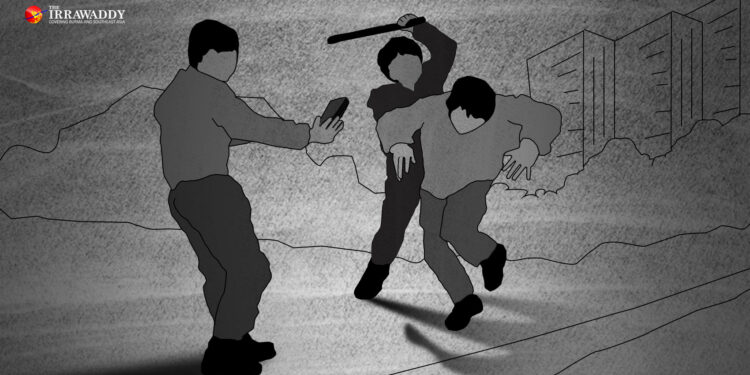by The Irrawaddy, January 30, 2025

In early January, a young man working at a service company in Yangon was abducted by a group of people while he was on his way home. He was beaten, dragged into a car, and sold to military recruiters but managed to escape the following evening.
The military regime has trained nine batches of male conscripts since enacting the Conscription Law last February. The law triggered a mass exodus, creating a situation reminiscent of England in the 18th-19th centuries, when press gangs roamed the land.
Here the young man, whose identity The Irrawaddy has decided not to disclose for security reasons, recounts his experience.
How did you get abducted?
It was around 8.30 p.m., and I was coming home from shopping. Near the Thamine Overpass, a car pulled over, and a group of people jumped out and grabbed me. When I tried to run, they hit me and forced me into their car. I passed out from the beatings and only came to when we were on the [Yangon-Mandalay] highway. There were two other boys in the car besides me. One was in the back and the other in the front. I don’t know where they were taken from. They transported us overnight.
How did they tell you to get into the car?
When they saw me, they said, “Hey, get in the car” and forcibly took me. They started to beat me when I resisted and tried to run. The area was dark, so I couldn’t call for help. They didn’t let us out of the car until we reached Magwe.
What happened then?
As you know, travelers’ IDs are checked at checkpoints on the highway, but we were never checked. Whenever they were stopped, they would just say it was for “recruitment” and were allowed to pass through. Passenger buses can’t travel at night and sometimes people have to sleep on the road [due to the curfew], but the car we were in drove straight to Magwe throughout the night without stopping.
I think we reached Magwe around 5:30 a.m. On arrival, we were handed over to brokers who were waiting to take us to Minbu. At a corner of the Magwe bus terminal, they transferred us to a tuk-tuk.
Two brokers came to pick us up. They took us to Minbu and kept us at their house. Around 7 a.m., we were taken to a clinic for a medical check-up. They drew our blood, but I’m not sure if they tested it.
Then around 9 a.m., we were taken to a tea shop on Strand Road in Minbu. The village administrators were there, and they discussed buying us. Since my ID card was from a township in Magwe Region, they were afraid to buy me, thinking it might cause problems.
So I was taken to another tea shop. They met with other administrators there, but those didn’t dare buy me either. Eventually, they took me to the Minbu District General Administration Department. The young men who were with me were already filling out their draft forms
While I was waiting, three people watched me to prevent me from escaping.
Around 10 a.m., a village administrator from a Magwe township finally bought me. I saw the money being handed over: it looked like about 5 million kyats.
After that, I had to fill out forms at the Minbu District General Administration Department. Then they transported me back to Magwe on a tuk-tuk and took me to the township administration office. I met a clerk there who was supposed to help me fill out the forms, but there were no other people around at that time.
The people who’d brought me stayed outside and I was left waiting inside the office, so I sneaked out and escaped through the back alleys. Once I reached the outskirts of the town, I hitched a lift and managed to get away.
Who do you think the abductors are?
They were neither military nor police. They looked like thugs or gangsters to me. They didn’t say anything in the car. When we arrived in Magwe, they told us we would have to join the military and, if asked by officers, we must reply that we were joining voluntarily. At first I refused to join. I told them that I wanted to contact my family, but they didn’t accept that. They said if I told the officers I was forcibly taken, I’d be beaten and imprisoned.
What does the relationship between your abductors and the military look like?
When we arrived at the Magwe administration office, they introduced me to a person they called “major.” This major asked if I was joining voluntarily. When I said yes, he even joked that I looked like I might run away. I overheard them asking if more people were coming. They said that more would arrive in the next two or three days.
What is your advice to young company staff?
Avoid going out alone at night. They may not abduct you if you’re in a group of two or more. In my case, there were only four abductors, including the driver. If you get snatched, assess your surroundings and look for an opportunity to escape. Don’t just give up and go along with it.
